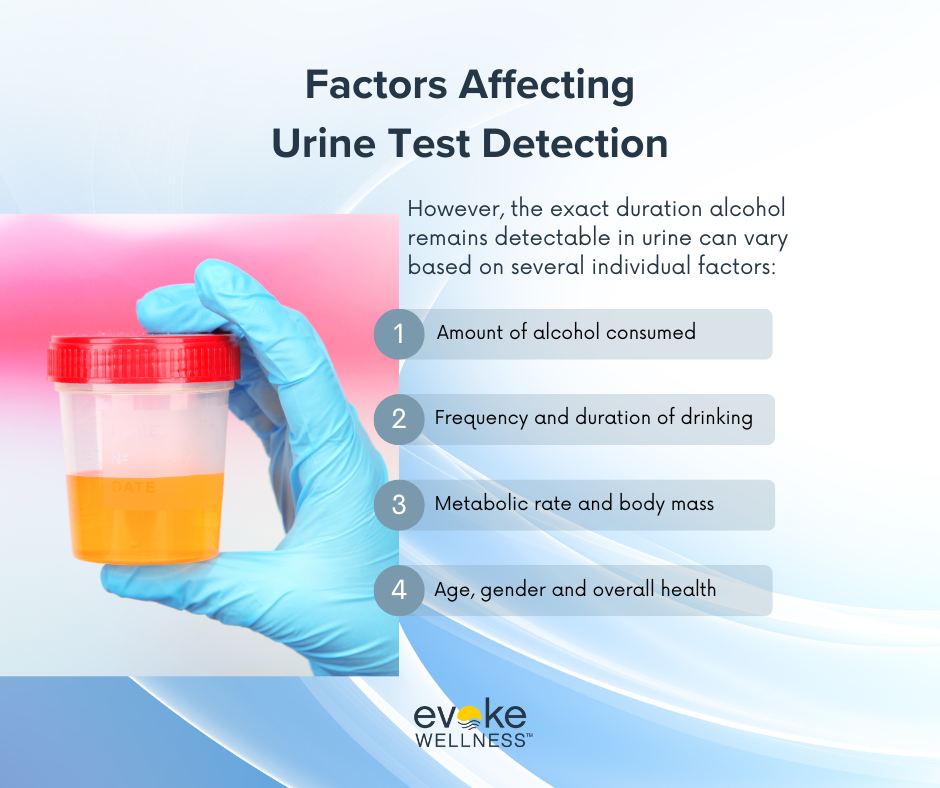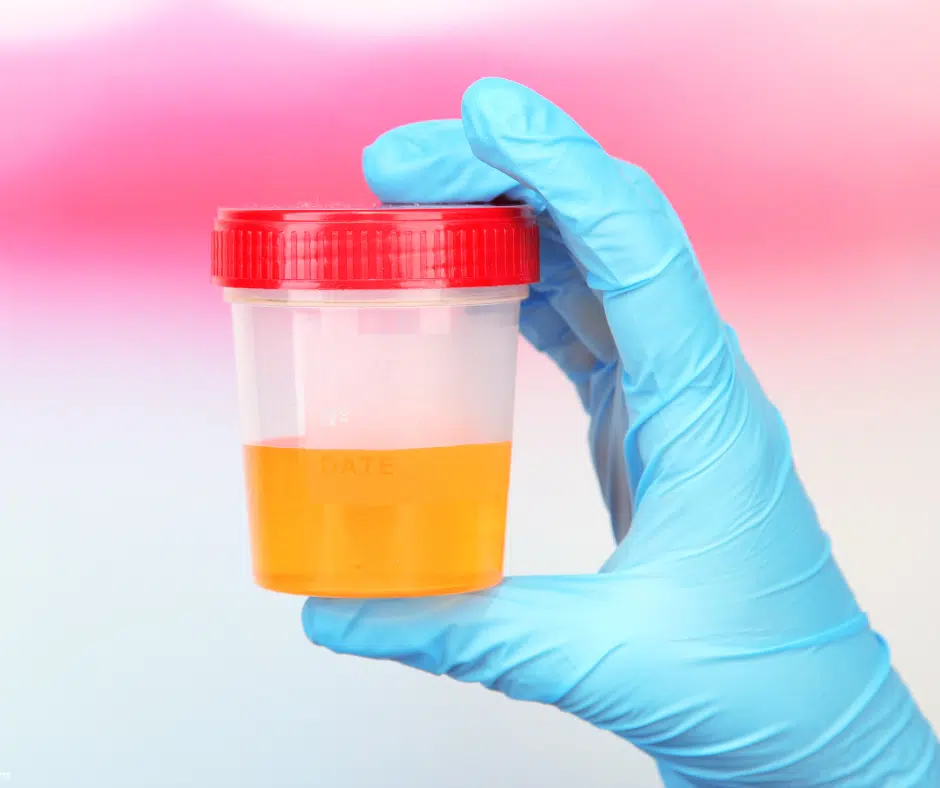Alcohol abuse and addiction remain persistent public health challenges, affecting millions of lives each year. As a healthcare professional, you may encounter patients struggling with alcohol use disorders. Urine alcohol tests have become an invaluable tool for detecting and monitoring alcohol consumption. This article will explore how these tests work, their applications in clinical settings, and their role in alcohol detox and addiction treatment programs. You’ll learn about the latest advances in urine alcohol screening, including recent statistics and studies that demonstrate their effectiveness. By understanding these diagnostic methods, you can better serve patients on their journey to recovery and sobriety.
Together, let’s embrace the journey to recovery and the promise of a new beginning. Call us at (833) 819-6066 today or reach out online.
How Does a Urine Drug and Alcohol Screening Work?
Urine Screening Process
A urine drug and alcohol screening typically involves collecting a urine sample from the individual being tested. This is done by having them provide a fresh urine sample in a designated collection cup or container. According to Evoke Wellness, urine testing is one of the most common and cost-effective methods for detecting substance use.
The sample is then analyzed in a lab setting using specialized testing methods and equipment. These tests screen for the presence of drug metabolites and alcohol byproducts that remain in the urine after the substances have been processed by the body.
Substances Detected
Urine drug tests can detect a wide range of substances, including:
- Marijuana (THC)
- Cocaine
- Opioids (codeine, morphine, oxycodone)
- Amphetamines and methamphetamines
- Benzodiazepines
The alcohol component specifically looks for biomarkers like ethyl glucuronide (EtG) and ethyl sulfate (EtS), which can indicate recent alcohol consumption or chronic heavy drinking patterns.
Sensitivity and Accuracy
While convenient, urine tests do have limitations in terms of detection windows. Most drugs are only detectable for a few days after use, though some substances like marijuana can show up for weeks in chronic users.
False positives are also possible due to prescription medications, over-the-counter drugs, foods or contaminants. Additional confirmatory testing may be required in some cases to verify initial screening results.
What To Expect During and After Urine and Alcohol Screening?
The Screening Process
During a urine alcohol screening, you will be asked to provide a urine sample in a secure, private environment. The sample is then tested for the presence of ethanol and other alcohol byproducts using advanced testing methods. This type of test can detect alcohol use for up to 24 hours after consumption, making it an effective tool for identifying recent alcohol abuse.
Interpreting the Results
If the screening detects alcohol in your system above the established cutoff level, it may indicate alcohol abuse or addiction. However, certain foods, beverages, and medical conditions can also cause false positive results, so further evaluation is often necessary. It’s essential to disclose any medications, supplements, or health conditions that could potentially affect the test results.
Next Steps After Screening
A positive alcohol screening may prompt further assessment and treatment recommendations. This could involve a comprehensive evaluation by an addiction professional to determine the severity of alcohol use and the most appropriate level of care. Effective treatment options like alcohol detox, therapy programs, and medication-assisted treatment are available to support recovery from alcohol addiction.
Urine Alcohol Tests: EtG and EtS
Typical workplace drug tests do not screen for alcohol. However, specialized urine tests can detect alcohol metabolites like ethyl glucuronide (EtG) and ethyl sulfate (EtS) for an extended period after consumption.
Alcohol Detection Window
Standard urine tests only identify alcohol itself for 3-5 hours after drinking. Blood tests extend this window to around 24 hours. But EtG and EtS tests offer a much wider detection timeframe:
- Light drinking: 3-4 days
- Heavy drinking: Up to 3 months
So while alcohol itself leaves the system quickly, these metabolites linger, flagging recent alcohol use.
Advanced Testing Methods
More advanced alcohol testing methods precisely identify ethanol from alcoholic beverages. This reduces chances of false positives from other substances like isopropanol or ethylene glycol. Discussing potential exposures can also avoid misinterpretations.
While not routine, EtG/EtS tests are a valuable tool for alcohol monitoring programs, addiction treatment, and legal circumstances requiring extended alcohol detection windows. They provide insight into drinking patterns over weeks or months – crucial for identifying alcohol abuse.
Windows of Detection in Urine Tests
Typical Detection Window
Urine tests have the longest window of detection for alcohol compared to other testing methods like blood, saliva or hair. According to studies, alcohol metabolites can generally be detected in urine for up to 6 weeks after the last drink. This wide detection window makes urine analysis highly effective for monitoring alcohol consumption over an extended period.
Factors Affecting Detection
Chronic heavy drinkers tend to have longer detection windows compared to casual or first-time drinkers.

Clinical Relevance
Alcohol urine screening is routinely used in addiction treatment programs and workplace drug testing. Its long detection window provides clinicians with valuable insights into a patient’s drinking patterns and compliance with sobriety goals. This data guides the appropriate care plan, treatment duration and aftercare monitoring required for lasting recovery from alcohol use disorders.
Factors Affecting Alcohol Detection in Urine
Alcohol Consumption Sources
- Consuming products containing alcohol like mouthwash, cough syrups, breath sprays, kombucha, cleaning products, hand sanitizers, and certain foods cooked with alcohol can lead to false positive urine alcohol screens. Even trace amounts from fermented or cooked items like protein bars, ripe fruits, baked goods etc. may trigger breathalyzer detection.
Sample Handling & Storage
Improper storage or prolonged exposure of the urine sample to room temperature can allow bacterial growth and increase ethyl glucuronide (EtG) levels, leading to false positive alcohol results on urine screens. Proper handling and refrigeration of samples is crucial.
Medical Conditions
Certain medical conditions like urinary tract infections in individuals with diabetes can also result in falsely elevated alcohol levels detected through urine testing. Other rare instances causing false positives include certain medications or health issues that alter the chemical composition of urine.
Alcohol Addiction Treatment
If struggling with alcohol addiction, seeking professional treatment like medically-supervised detox and rehabilitation programs is recommended rather than risking consequences of a positive test result. Urine screening aids addiction recovery by monitoring sobriety.
Understanding Urine Test Results
Accuracy & False Positives
While urine tests are highly accurate in detecting alcohol and substance abuse, false positives can occur. According to Evoke Wellness, certain products containing trace amounts of alcohol like mouthwash, cough syrups, or fermented foods can trigger a false positive result on an ethyl glucuronide (EtG) urine screen. Rare cases like bacterial growth in improperly stored samples or diabetes-related UTIs may also lead to inaccurate readings.
Avoiding False Results
To ensure accurate test results, individuals should refrain from using any alcohol-containing products before undergoing a urine screen. Consulting resources like the National Library of Medicine’s Household Products Database can help identify potential interferents. For those struggling with alcoholism, Evoke Wellness offers comprehensive addiction treatment, including medical detox and therapy tailored to each person’s needs.
Other Testing Methods
While urine is common for alcohol testing, other drug test types like saliva, hair follicle, and blood analysis are available. Each method has pros and cons regarding detection times, invasiveness, and the substances it can identify. Proper testing procedures are crucial to avoid contamination and ensure accurate, legally-defensible results.
Alcohol Detox and Treatment Programs
Understanding Alcohol Withdrawal
When someone struggling with alcohol addiction decides to stop drinking, they may experience uncomfortable and potentially dangerous withdrawal symptoms. According to the National Institute on Alcohol Abuse and Alcoholism, around 5% of adults in the U.S. had an alcohol use disorder in 2019. For these individuals, safely detoxing from alcohol under medical supervision is crucial.
Medically-Assisted Detox
During detox, medications like benzodiazepines such as Librium (chlordiazepoxide) may be prescribed to manage withdrawal symptoms and prevent complications. These medications help ease the transition to sobriety by reducing anxiety, tremors, and seizure risk associated with alcohol withdrawal.
Comprehensive Treatment Programs
After completing detox, patients transition into comprehensive addiction treatment programs tailored to their unique needs. Inpatient rehab programs provide a structured, substance-free environment with medical care, individual and group therapy, counseling, and support for achieving long-term sobriety. Evidence-based therapies such as cognitive-behavioral therapy (CBT) help patients develop healthy coping mechanisms and prevent relapse.
FAQ: How Long Can Alcohol Be Detected in Urine Test?
Detection Window
Alcohol can typically be detected in urine tests for up to 80 hours (3-4 days) after the last drink. However, the exact detection window varies based on several factors like the amount and type of alcohol consumed, an individual’s metabolism rate, hydration levels, and the sensitivity of the testing method used. According to experts, alcohol from beer, wine, and liquor is generally detectable in urine for around 12-48 hours after the last drink. But heavy or binge drinking may extend this window up to 80 hours.
Individual Factors
Age, gender, body mass, and liver function can significantly influence how long alcohol remains detectable in one’s urine. Individuals with slower metabolisms or liver impairment may have a longer detection window compared to those with faster metabolisms. Similarly, older adults tend to eliminate alcohol from their system more slowly due to age-related changes in metabolism and liver function.
Urine Test Sensitivity
The sensitivity of the urine alcohol testing method plays a crucial role. Immunoassay tests, though less expensive, may sometimes produce false positives. On the other hand, gas chromatography/mass spectrometry (GC/MS) tests are considered more accurate but costlier. It’s essential to account for potential false positives caused by certain foods, beverages, medical conditions, or improper sample handling.
Overall, the only way to avoid alcohol detection in a urine test is to abstain from drinking for several days before the test. Attempting methods like flushing out or diluting one’s system is generally ineffective and can lead to additional consequences.
Conclusion
In conclusion, urine alcohol tests are a valuable tool for detecting alcohol abuse and addiction. By understanding how these tests work and their limitations, you can make informed decisions about your health and recovery. If you or a loved one are struggling with alcohol use, don’t hesitate to seek professional help. Alcohol detox and addiction treatment programs offer comprehensive support to overcome dependence safely and effectively. Remember, recovery is possible with the right resources and commitment. Take the first step today by reaching out to a qualified treatment center to discuss your options for alcohol testing, detoxification, and long-term recovery support. Your journey to lasting sobriety can begin now.
Begin Your Journey with Evoke Wellness at Miramar
If you or a loved one is considering treatment, Evoke Wellness at Miramar invites you to contact us. Our compassionate team is ready to answer your questions, discuss your needs, and help you take the first steps toward recovery. In Miramar, you’ll find more than just a treatment program – you’ll discover a community dedicated to your wellness and success. Together, let’s embrace the journey to recovery and the promise of a new beginning. Call us at (833) 819-6066 today or reach out online.


